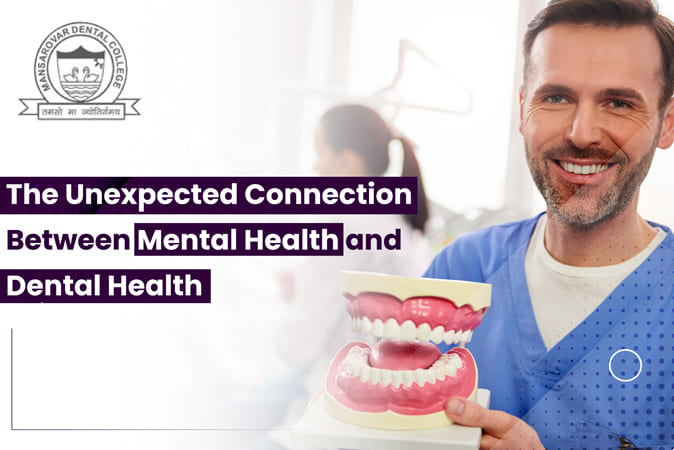
You must have heard that physical health plays an important role in your mental well-being. But few know that dental health is intertwined with mental health, it is because of the teeth 's connection with the brain. In an era, which receives much appreciation for mental health well-being, we are forgetting the contributing factors essential for the epitome of well-being.
Good dental health goes beyond just having a bright smile; it has implications for your ability to eat, speak, and interact comfortably with others. Through this blog, we shall help you identify the connection of teeth with brain and evaluate measures you can take to better your life.
Also Read: Are Dental Health and Mental Health Related?
The well-being of oral health includes maintaining the health of your teeth, gums, and mouth. Today dental health is beyond this definition and requires multidisciplinary understanding. Common dental issues include-
a. Cavities: Caused by the buildup of plaque and bacteria on the teeth, cavities can lead to tooth decay and pain.
b. Gingivitis and Gum Disease: Gingivitis is the inflammation of the gums, often caused by poor oral hygiene. If left untreated, it can progress to gum disease leading to tooth loss.
c. Bad Breath (Halitosis): Poor oral hygiene, certain foods, and underlying health issues can contribute to persistent bad breath.Tooth
d. Sensitivity: Sensitive teeth can react to hot, cold, sweet, or acidic stimuli, often due to exposed tooth roots or worn enamel.
e. Oral Infections: Infections in the mouth, such as oral herpes (cold sores) and oral thrush (fungal infection), can cause discomfort and affect overall well-being.
Research has shown that mental health issues can impact oral health, and poor dental health can also have implications for mental well-being. It is because teeth nerves are connected to the brain. Here is some evidence that shows the connection of teeth with brain:
Stress and anxiety lead to teeth grinding, a condition called bruxism. Frequent grinding causes dental problems such as tooth sensitivity, worn enamel, and even chipped teeth. Discomfort leads to frustration and thus poor mental health.
Individuals experiencing depression may struggle to maintain proper oral hygiene practices. Neglect of brushing and flossing leads to dental issues like cavities and gum disease. Poor oral health can further impact self-esteem and worsen depressive symptoms.
Mental health patients have been known to suffer from eating disorders like anorexia nervosa, bulimia nervosa, and binge eating disorder. These can have detrimental effects on oral health.
To counter depression and anxiety, mental health patients struggle to avoid the use of drugs and tobacco. Such instances lead to isolation, mouth cancer, self-exclusion, etc. This proves that mental and dental health are interrelated and often compound one another.
Some individuals experience dental anxiety or phobia, which can lead them to avoid dental appointments and necessary oral care. This avoidance can result in the progression of dental issues, causing physical discomfort, and further increasing anxiety.
Mansarovar Dental College recognises the connection of teeth with the brain and aspires to address dental health across India, for the better mental well-being of the patients.
Prevention is key to maintaining optimal dental health. Here are some important preventive measures to address pain caused by the connection of teeth with brain:
Mental and dental well-being are interconnected. Individuals need to recognize the relationship between the connection of teeth with brain and take steps to address the overall aspect of well-being. This might involve seeking professional help for mental health concerns, practising good oral hygiene, attending regular dental check-ups, and communicating openly with healthcare providers about any medications or conditions that could impact oral health. Additionally, healthcare professionals, including dentists and mental health practitioners, can work collaboratively to provide comprehensive care for patients.
Mental health leads to anxiety, which can affect being still or stress-free during dental treatments. As there is a connection of teeth with brain, a complex surgical process often requires patience and long-term treatment. Mental health conditions can worsen the treatment regimen.
Gum disease can cause soreness, inflammation and excruciating pain. It affects productivity and hinders day-to-day activities leading to stress and a poor lifestyle. Frequent visits to clinics can affect the mental health of patients.
Yes, dental infection leads to pain causing a situation of stress and anxiety because of teeth and brain connection. It is crucial to visit a dental health professional to eliminate the infection as soon as possible, to avoid such situations.
Yes, teeth nerves are connected to brain. Any stress to the nerves leads to throbbing in the brain. Teeth connection with brain leads to a direct impact of dental health on mental well-being.
© 2017 Mansarovar Dental College Powered by SynQues